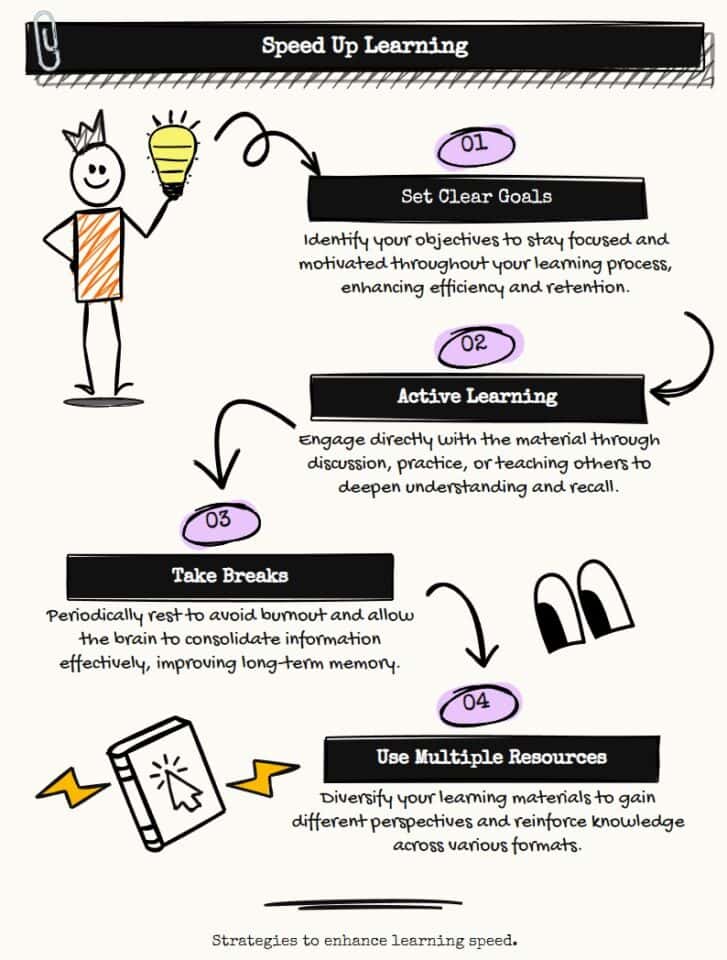Ever feel like your brain’s leaking info? You’re not alone. Studies show we forget about 70% of what we learn within a day. 3 But don’t sweat it – this article’s here to help. We’ll share 15 brain-boosting tricks to help you learn faster and remember more.
Ready to level up your study game? Let’s go!
Key Takeaways
Use active learning techniques like teaching others and drawing mind maps to cement info in your brain better than passive reading.
Try the Pomodoro Technique: work for 25 minutes, then take a 5-minute break to keep your mind fresh and focused.
Set up a quiet study space with good lighting (6500 K) and comfort to boost alertness and help you do better on tests.
Use mnemonic strategies and spaced repetition to move facts from short-term to long-term memory more effectively.
Regular exercise, like 30 minutes of aerobic activity most days, can make your hippocampus bigger and help brain cells grow and connect.
Table of Contents
Enhancing Your Learning Abilities

Ready to supercharge your brain? Let’s dive into some game-changing tricks. These hacks will turn you into a learning ninja in no time!
Embrace a Growth Mindset

A growth mindset can boost your learning. It’s the idea that you can increase your intelligence through hard work. Students with this view tackle challenging tasks and recover from failures.
They see effort as the way to improve, not a weakness. A recent study showed that teaching a growth mindset increased grades by 0.10 points on average. 1 It also resulted in more students enrolling in challenging math classes.
Developing this mindset is simple. Begin by complimenting effort over natural ability. Say “Great job working so hard!” instead of “You’re so smart!” See mistakes as opportunities to learn.
When you make an error, ask “What can I learn from this?” Set goals that push you a bit. Small successes build confidence over time. Your brain is like a muscle – the more you use it, the stronger it gets! 2
Believe you can and you’re halfway there. – Theodore Roosevelt
Establish Effective Study Routines

Creating solid study habits can make learning easy. Start by choosing a set time each day for studying. This could be right after breakfast or in the evening – whatever suits you best.
Stick to this schedule consistently. Your brain will soon adjust and prepare to learn at these times. It’s like training a puppy… but the puppy is your mind! 3
Next, divide your study time into segments. Don’t try to study for hours without breaks. Instead, study for 25 minutes, then take a 5-minute break. This method, called the Pomodoro Technique, keeps your mind fresh and focused.

During breaks, stretch or grab a snack. Add variety by trying different project ideas for students. This way, you’ll stay engaged and avoid burnout.
Keep in mind, a good routine isn’t about perfection – it’s about consistency. So, find what works for you and keep at it! 4
Focusing Techniques for Better Learning

Ever feel like your mind’s a wild monkey? Let’s tame that beast! Focus is key to learning faster, and we’ve got some tricks up our sleeve. Grab a cup of joe and let’s dive into some game-changing focus hacks.
Implement the Pomodoro Technique
The Pomodoro Technique is a game-changer for study ninjas. It’s simple: work for 25 minutes, then take a 5-minute break. 6 Rinse and repeat. This method keeps your brain fresh and focused.
I’ve used it myself and saw my productivity soar. It’s like giving your mind a mini-vacation every half hour.
The Pomodoro Technique is not about how much you do in 25 minutes. It’s about how refreshed you can be when you get back to work.
Studies show our focus drops after 45 minutes of non-stop work. 5 By breaking tasks into bite-sized chunks, you’ll avoid burnout and keep your energy high. Plus, those short breaks are perfect for a quick stretch or snack.
Trust me, your body and brain will thank you!
Reduce Surrounding Distractions
Now that you’ve got your Pomodoro timer ticking, let’s tackle those pesky distractions. Trust me, I’ve been there – trying to study with a buzzing phone and chatty roommates. It’s like trying to read a book in the middle of a circus!
First things first, find a quiet spot where you can’t see others. It’s amazing how much faster you’ll learn when you’re not watching your neighbor’s TikTok dance moves. 7 Next, grab some noise-canceling headphones or earplugs to block out sounds.
And don’t forget to silence your phone – those notifications are study kryptonite! 4 With these simple tricks, you’ll create a distraction-free zone that’ll supercharge your learning.
It’s like giving your brain a VIP pass to focus town!
Effective Methods for Information Retention

Ever wondered how to make info stick in your brain? Let’s dive into some cool tricks that’ll turn you into a memory wizard. These methods aren’t just about cramming facts – they’re about really getting what you’re learning.
Practice Active Learning Techniques
Active learning is a game-changer for study experts. It’s about more than reading your notes over and over. Instead, you’re getting hands-on with the material. Try explaining concepts to a friend or even your pet.
Draw mind maps to connect ideas. Quiz yourself regularly. These tricks help cement info in your brain better than passive reading ever could. 8
I’ve found that teaching others is an excellent way to learn. Once, I struggled with a tough math concept. But after explaining it to my little sister, it clicked for me too! Active learning also includes things like solving problems, doing experiments, or role-playing scenarios.
It’s all about engaging with the material in different ways. This approach helps you remember more and understand deeper. 9
Tell me and I forget, teach me and I may remember, involve me and I learn. – Benjamin Franklin
Utilize the Feynman Technique for Understanding
The Feynman Technique is a straightforward, effective learning method. It’s named after Richard Feynman, a renowned physicist. Here’s how it works: First, choose a topic and explain it like you’re teaching a child.
Use simple language and avoid complicated terms. If you struggle, review your notes and try again. This approach helps you identify gaps in your understanding. It also simplifies complex concepts. 10
I’ve tried this method myself, and it’s really helpful. Once, I had trouble with a difficult math concept. I attempted to explain it to my younger sister using everyday items. This made me break down the idea into smaller, manageable parts.
She understood it, and I gained a much better grasp of it too! The Feynman Technique isn’t just about learning – it’s about really understanding something. It’s similar to brightening a dark room.
Everything becomes clearer all at once. 11
Setting Up a Learning-Friendly Environment

Your study space can make or break your learning. A good setup boosts focus and helps you soak up info like a sponge. Let’s dive into how to create a killer study zone that’ll turn you into a learning ninja!
Organize a Dedicated Study Area
Setting up a study space is key for learning success. Pick a quiet spot with good light where you can focus without distractions. This could be a corner of your bedroom or a nook in the living room.
Make sure it’s comfy but not too cozy – you don’t want to doze off! 13 Keep your desk tidy and stock it with all your study tools. I’ve found that having everything at hand helps me stay on task.
Your environment shapes your behavior. Create a space that inspires learning.
Folders, brackets, and apps can help sort your stuff. I use color-coded folders for different subjects and a digital calendar to track deadlines. 12 It’s amazing how much easier studying becomes when you’re not wasting time hunting for notes or books.
Plus, a neat space just feels good – it’s like a fresh start every time you sit down to work.
Optimize Lighting and Comfort
Lighting matters more than you think for learning. Studies show that 6500 K lighting boosts alertness and helps students do better on tests. 14 It’s like giving your brain a little boost! But comfort counts too.
A cozy chair and the right temp can make a big difference. You’ll focus better and learn faster when you’re not fidgeting or shivering. So, set up your study spot with bright, cool lights and a comfy seat.
Your brain will thank you!
Don’t forget about noise levels, either. A quiet space helps you concentrate. But some people like soft background music. Try different setups to find what works best for you. The goal is to create a space where your mind can zoom in on what you’re learning.
With the right lighting and comfort, you’ll be a study ninja in no time! 15
Techniques to Boost Memory

Memory tricks can boost your brain power. Try these great tips to remember things easily!
Use Mnemonic Strategies
Mnemonic tricks can boost your memory. These smart shortcuts help you remember things faster and better. You’ve probably heard of “Roy G. Biv” for rainbow colors, or “Every Good Boy Does Fine” for music notes.
But that’s just the start! Memory champs use a cool method called “loci” to remember long lists. It’s like putting items in a familiar place in your mind. Cool, right? 16
Brain scans show that using mnemonics changes how our brains work. It’s not just one area that improves – the whole network gets better! This means you’re not just memorizing facts, you’re actually changing your brain.
So next time you need to remember something tough, try a mnemonic. Your brain will love it! 17
Adopt Spaced Repetition for Better Recall
Spaced repetition is a game-changer for memory. It’s like giving your brain little workouts over time. You review info at growing intervals. This trick helps move facts from short-term to long-term memory.
Studies show it boosts recall better than cramming. 18 It’s simple: learn, wait, review, repeat. Each review strengthens those brain connections.
Repetition is the mother of learning, the father of action, which makes it the architect of accomplishment. – Zig Ziglar
Want to make it work for you? Start with flashcards or apps like Anki. Review new info often at first, then space it out more. This method builds stronger neural pathways. 19 It’s perfect for busy women juggling work, family, and personal growth.
Your brain will thank you!
Reinforce Learning Through Evaluation

Checking your progress is key to learning better. Regular quizzes and feedback can help you spot weak areas and boost your skills.
Conduct Frequent Self-Assessments
Self-checks are key to learning faster. Take a minute to quiz yourself often. It’s like giving your brain a workout. You’ll spot weak areas and fix them quick. Plus, it’s a great way to see how far you’ve come.
I used to hate self-tests, but now I love ’em. They show me what I really know. 20
Color-coding helps big time. I mark easy stuff green, so-so yellow, and tough red. It’s visual and fun. Then I zero in on the reds. This trick helped me ace my last exam. Simple rubrics work wonders too.
They break down what you need to know. No guessing games. Just clear goals to hit. 21
Obtain and Use Constructive Feedback
Feedback is gold for learning. Ask teachers, friends, or study buddies to review your work. They’ll spot things you missed. Good feedback points out strengths and areas to improve.
It’s not just about grades – it’s about growing. Use the tips to boost your skills. Try new study methods based on what others say. This helps you learn faster and better. 22
Don’t fear criticism – embrace it! Feedback shows you’re on the right track or need a new approach. It builds self-awareness and helps set goals. Research shows students who use feedback improve more.
They develop skills to check their own work, too. So, seek out honest opinions and put them to use. Your brain will thank you! 23
Physical Health’s Impact on Learning

Your brain’s a powerhouse – but it needs fuel! A healthy body pumps up your learning game. Exercise and good grub aren’t just for gym rats… they’re secret weapons for study ninjas, too.
Commit to Regular Physical Activity
Get moving to boost your brain power! Regular exercise isn’t just good for your body – it’s a game-changer for your mind too. Aerobic workouts, like jogging or dancing, can actually make your hippocampus bigger.
That’s the part of your brain that handles memory and learning. 24 Plus, when you break a sweat, your body pumps out more BDNF – a special protein that helps your brain cells grow and connect.
So lace up those sneakers and hit the gym, trail, or dance floor. Aim for at least 30 minutes of heart-pumping activity most days. Your brain will thank you with sharper thinking and better recall. 25 It’s like giving your noggin a mini-makeover every time you work out. Who knew getting fit could make you smarter too?
Focus on Sleep and Balanced Diets
Sleep is your brain’s best friend. It helps you think better and stay happy. But many of us don’t get enough good sleep. To fix this, try going to bed at the same time each night. Also, keep your room dark and cool.
A comfy mattress helps too. 26
What you eat is just as important as sleep. Your brain needs the right fuel to work well. Start your day with a healthy breakfast – maybe some eggs and fruit. Avoid junk food. It might taste good, but it won’t help your brain.
Instead, eat plenty of veggies, lean meats, and whole grains. These foods give your brain what it needs to learn quickly and remember well. 27
Leveraging Technology for Enhanced Learning

Tech can supercharge your learning. Apps and online tools make studying a breeze – if you know how to use ’em right.
Use Educational Apps Effectively
Educational apps can boost your learning. They’re like having a teacher with you all the time. These apps help with homework, make studying enjoyable, and work with busy schedules.
During lockdowns, they became essential for students everywhere. 28
To get the best from these apps, choose ones that fit your needs. Look for apps with good reviews and clear benefits. Set aside regular time to use them – even if it’s just 15 minutes a day.
Try different apps to find what suits you best. Some might help with math, others with languages. The important thing is to use them regularly and check your progress. With the right apps, you’ll learn quicker and retain more. 29
Access Online Learning Tools
Apps are great, but online learning tools take it up a notch. These tools open up a world of knowledge right at your fingertips. Imagine having access to top-notch courses from Harvard or MIT…
for free! That’s the power of online learning platforms like Coursera and edX. 30
I’ve used these tools myself and they’re a game-changer. You can learn at your own pace, pause and rewind lectures, and even join study groups with people from all over the globe. It’s like having a virtual classroom that fits in your pocket.
Plus, many offer certificates that can boost your resume. So why not give them a try? Your brain (and your career) will thank you! 31
Seeking Support and Resources

Need a boost in your studies? Don’t go it alone! Reach out to smart folks and tap into cool resources. They’ll help you level up your learning game in no time.
Utilize Academic Writing Services
Academic writing services can be a lifesaver for busy students. These pros know how to craft top-notch papers that’ll impress your professors. I’ve used an essay writing service at EduBirdie before, and it was a game-changer.
They helped me organize my ideas and polish my writing. It’s like having a personal tutor who guides you through tough assignments. 32
But don’t just hand over your work and forget about it. Use these services as a learning tool. Read the papers they write for you. Take notes on their style and structure. This way, you’ll boost your own skills while getting help.
It’s a win-win that’ll make you a better writer in the long run. 33
Consult with Tutors and Mentors
Moving from academic writing services, let’s talk about getting help from experts. Tutors and mentors can be game-changers in your learning journey. They offer personalized guidance and support that’s hard to find elsewhere.
Tutors can help you tackle tough subjects head-on. They break down complex ideas into bite-sized chunks. Mentors, on the other hand, offer big-picture advice. They’ve been where you are and can share valuable insights.
Both can boost your confidence and motivation. Plus, they can spot your weak areas and help you improve. It’s like having a personal coach for your brain! Two-thirds of U.S. workers seek extra training to move up in their careers. 34 With a tutor or mentor, you’re joining a smart crowd that’s serious about growth. 35
Benefits of Teaching and Sharing Knowledge

Teaching others is a superpower for learning. It forces you to break down complex ideas and explain them simply – which cements your own understanding.
Teach to Enhance Understanding
Teaching others is a powerful way to boost your own learning. It’s not just about helping someone else – it’s a chance to solidify your own grasp on a topic. When you explain something, you have to break it down into simple parts.
This process helps you spot gaps in your own knowledge. You’ll find yourself thinking, “Oh, I never thought about it that way before!” 37
Sharing your know-how also sparks new ideas. As you talk things through, you might stumble upon fresh insights. Plus, the questions others ask can push you to dig deeper. It’s like a workout for your brain! So next time you’re stuck on a tough concept, try teaching it to a friend.
You might be surprised at how much clearer things become – for both of you. 36
Participate in Group Study Sessions
Group study sessions can supercharge your learning. They’re like a brain gym where you flex your mental muscles with friends. You share ideas, quiz each other, and fill in knowledge gaps.
It’s about hitting the books together and teaching what you know, which helps cement info in your mind. Plus, it’s way more fun than studying solo! 39
These group pow-wows work best when they’re small and organized. Aim for 3-5 people max. Give everyone a job – like note-taker or time-keeper. This keeps things on track and makes sure everyone chips in.
Teamwork makes the dream work… especially when that dream is acing your exams! 38
People also Ask
What’s the deal with the forgetting curve?
The forgetting curve is like a pesky thief. It steals your memories over time. But don’t fret! Active recall and spaced-repetition are your secret weapons. They help you fight back and keep those brain nuggets safe.
How can I make my study sessions more effective?
Ditch rote memorization. It’s old news. Instead, try desirable difficulty. It’s like giving your brain a workout. Mix in some distributed practice and retrieval exercises. Your noggin will thank you later.
Is there a way to boost my brain power naturally?
You bet! Physical exercise is like miracle grow for your brain. It pumps up that brain-derived neurotrophic factor. Pair it with a healthy diet and good sleep cycles. You’ll be a learning machine in no time.
Can mindfulness really help me learn faster?
Absolutely! Mindfulness is like a superpower for your attention span. It helps you focus and reduces stress. Plus, it’s great for problem-solving. Give it a shot during your next study session.
What’s the scoop on mnemonic devices and chunking?
These are like cheat codes for your memory. Mnemonic devices help you remember tricky info. Chunking breaks big info into bite-sized pieces. They’re perfect for tackling tough subjects or long to-do lists.
How important is sleep for learning?
Sleep is the unsung hero of learning. It’s crucial for memory consolidation. Skimp on sleep, and you’re asking for trouble. Aim for those sweet, sweet slow wave and non-REM sleep stages. Your brain will love you for it.
References
^ https://www.ncbi.nlm.nih.gov/pmc/articles/PMC6786290/
^ https://www.icpas.org/information/copy-desk/insight/article/digital-exclusive-2018/5-ways-to-embrace-a-growth-mindset
^ https://learningcenter.unc.edu/tips-and-tools/studying-101-study-smarter-not-harder/
^ https://www.brainscape.com/academy/how-to-focus/
^ https://medium.com/@pareshravi/maximizing-focus-the-pomodoro-technique-my-journey-to-productive-breakthroughs-3ef10324c3e0
^ https://todoist.com/productivity-methods/pomodoro-technique
^ https://www.bsmcon.edu/sites/default/files/assets/files/Tips%20for%20Reducing%20Distractions%20at%20Home.pdf
^ https://medicwealth.medium.com/scientifically-proven-methods-to-study-effectively-reduce-forgetfulness-and-increase-retention-f2248c10fba7
^ https://medicine.llu.edu/academics/resources/brain-based-techniques-retention-information
^ https://fs.blog/feynman-learning-technique/
^ https://todoist.com/inspiration/feynman-technique
^ https://northlakebh.org/creating-effective-study-spaces-to-maximize-organization-and-peace-of-mind/
^ https://www.joyce.edu/blog/10-best-study-space-tips/ (2022-03-24)
^ https://www.optica.org/about/newsroom/news_releases/2016/optimizing_lighting_for_better_learning/ (2016-04-26)
^ https://www.mkthink.com/post/how-to-optimize-environments-for-better-learning
^ https://www.ncbi.nlm.nih.gov/pmc/articles/PMC5439266/
^ https://zapier.com/blog/better-memory/
^ https://www.ncbi.nlm.nih.gov/pmc/articles/PMC6607761/
^ https://blog.readwise.io/hack-your-brain-with-spaced-repetition-and-active-recall/ (2019-09-15)
^ https://www.researchgate.net/profile/David-Boud/publication/239969990_Enhancing_Learning_Through_Self-Assessment/links/5b277a5e0f7e9be8bdae93d8/Enhancing-Learning-Through-Self-Assessment.pdf
^ https://www.edutopia.org/discussion/self-assessment-powerful-tool-improve-student-learning-and-understanding (2016-04-11)
^ https://www.researchgate.net/publication/287040880_Constructive_feedback_as_a_learning_tool_to_enhance_students%27_self-regulation_and_performance_in_higher_education
^ https://www.ncbi.nlm.nih.gov/pmc/articles/PMC5864461/
^ https://www.health.harvard.edu/blog/regular-exercise-changes-brain-improve-memory-thinking-skills-201404097110
^ https://www.ncbi.nlm.nih.gov/pmc/articles/PMC6770965/
^ https://www.ncbi.nlm.nih.gov/pmc/articles/PMC9794932/
^ https://www.nu.edu/blog/best-brain-foods-for-studying/
^ https://www.ncbi.nlm.nih.gov/pmc/articles/PMC8800936/
^ https://www.ncbi.nlm.nih.gov/pmc/articles/PMC8916741/
^ https://moraistechhive.com/leveraging-technology-for-enhanced-learning/
^ https://www.ncbi.nlm.nih.gov/pmc/articles/PMC10259587/
^ https://world.edu/building-a-second-brain-for-academic-writing/
^ https://www.linkedin.com/pulse/15-tips-smart-studying-genevieve-m-sabala-ph-d-c-mpa-msw-
^ https://www.fastcompany.com/3063173/six-brain-hacks-to-learn-anything-faster (2016-08-30)
^ https://www.ncbi.nlm.nih.gov/pmc/articles/PMC4462934/
^ https://www.ncbi.nlm.nih.gov/pmc/articles/PMC6974913/
^ https://www.ncbi.nlm.nih.gov/pmc/articles/PMC4046684/
^ https://www.yc.edu/v6/learning-center/docs/study-group-student-benefits.pdf
